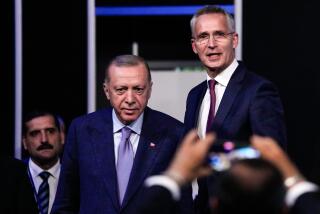Turkish Military Rejects Probe
- Share via
ANKARA, Turkey — The Turkish military said Monday that it would not heed a call to investigate a top general accused of setting up a rogue force to scuttle the country’s bid to join the European Union.
The general staff command called the allegations that one of its brass had abused his office “imaginary” and politically motivated. “Parts of this indictment went too far and had more political than legal content,” the command said in a statement.
The rebuttal came two weeks after the prosecutor of the southeastern city of Van named Gen. Yasar Buyukanit and several other prominent officers in a 100-page indictment of three men charged in a bombing last year.
The indictment, which was leaked to the media, unleashed a storm of controversy in a nation where criticizing the military is a punishable offense.
Opposition politicians accused Turkey’s ruling Justice and Development Party of secretly encouraging the prosecutor in a bid to weaken Buyukanit.
A passionate secularist distrusted by the former Islamists of the ruling party, Buyukanit is expected to become the chief of the general staff when the current incumbent, Gen. Hilmi Ozkok, retires in August.
The Turkish military regards itself as the custodian of the pro-Western, secular system introduced by the founder of modern Turkey, Kemal Ataturk. It has seized power three times in the last four decades.
In 1997, the military forced the country’s first Islamist-led government out of power on charges that it was seeking to introduce religious rule.
In an effort to ease tensions, Prime Minister Recep Tayyip Erdogan has distanced himself from the case.
“The military is the apple of our eye. It’s one of our most respected institutions,” he said in a recent speech.
Justice Ministry officials say they have launched an investigation against the prosecutor, Ferhat Sarikaya.
In the indictment, Sarikaya charged that the illegal group allegedly formed by Buyukanit was behind the November bombing of a bookshop run by a Kurdish nationalist in the town of Semdinli, on the Iraqi border. Suspicions that the security forces were involved in the blast surfaced when locals chased and caught three suspects, two of whom were later identified by authorities as noncommissioned officers.
The third, identified as a Kurdish rebel-turned-informer, claimed that the bookshop owner was a member of the outlawed Kurdistan Workers Party.
The suspects’ car, parked near the scene of the attack, was registered to the local gendarmerie and contained weapons and a list of 105 potential targets, including the bookshop owner.
Buyukanit provoked sharp criticism when he defended one of the suspects, noncommissioned officer Ali Kaya, as a “good fellow” who had served under the general.
In the indictment, prosecutor Sarikaya charged that the bombing was part of a broader campaign to provoke a conflict with nationalists in the predominantly Kurdish area and create an atmosphere of instability that would weaken civilian control.
If convicted on charges of attempted murder and seeking to sabotage the unity of the state, the men could serve life sentences. Buyukanit is named as a possible accomplice. By law, he cannot be tried in civilian court.
Civilian control of Turkey’s powerful armed forces is among the foremost conditions set by the European Union if Turkey is to gain full membership in the alliance. Although some of the army’s powers have been trimmed, it continues to exert influence on domestic and foreign policy issues.
More to Read
Sign up for Essential California
The most important California stories and recommendations in your inbox every morning.
You may occasionally receive promotional content from the Los Angeles Times.










